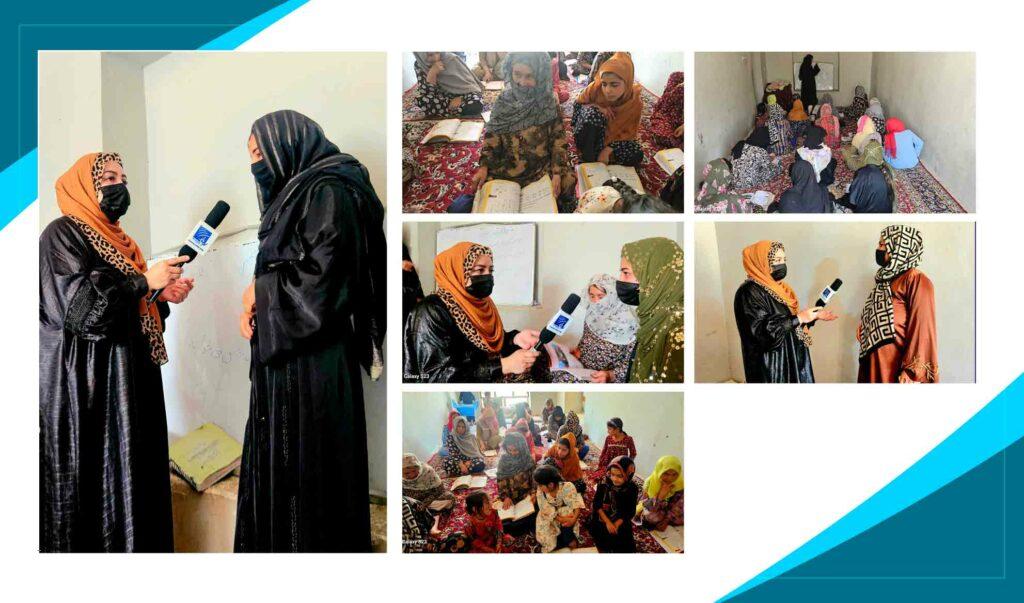By Kashmir Khan Saayra Jamalzada
SHIBERGHAN (Pajhwok): In a modest classroom tucked away in Shiberghan, the capital of northern Jawzjan province, elderly women and young girls sit shoulder to shoulder, gripping their pens with determination.
Here, they are not just learning to read and write—they are reclaiming opportunities once denied to them.
This life-changing opportunity has been made possible by Saayra Jamalzada, a 38-year-old mother of six from Qura village in Shiberghan. Having left school after third grade due to family hardships, Saayra is now paving the way for others by launching a literacy course for 100 women.
“I only studied until the third grade,” she says with a soft but hopeful voice. “My family’s problems didn’t let me continue. Now, I want to give other women and girls—those who missed out like I did—the chance to receive the education I lost.”
In Saayra’s course, students study the Quran, Dari language, mathematics, and religious studies. Many participants are the primary breadwinners in their households, attending the classes with immense dedication and motivation.
However, Saayra worries about limited resources. “The Department of Education provided us with books, but it’s not enough,” she explains.
Her class includes women in their 40s and 50s, alongside younger girls who never had access to formal education.
One of the course instructors, Zakiya, highlights that Islamic teachings are also part of the curriculum. “Most of the students come from poor families,” she says. “Some can’t even afford basic stationery. If any charitable organization supports us, we could provide supplies and enroll more students.”
Gratitude, grit in every page turned
In one corner of the classroom, amid the soft rustling of notebook pages and whispered alphabets, sits Bibi Jan, a 58-year-old woman with a weathered scarf, radiant eyes, and a warm smile. She is one of the most enthusiastic students.
“When I was a girl, going to school was forbidden for us,” she recalls. “Now, I want to read names, recognize shop and hospital signs, and escape the darkness of illiteracy. I come every day with hope—even when my legs hurt.”
Despite decades of deprivation, Bibi Jan walks to class daily, her childlike eagerness undimmed by age or distance. Her face bears the marks of years of toil and silence, yet her eyes shine with belief in a better future. Every word she learns is a step toward reclaiming a piece of the life she once missed.
A mother of five and grandmother of eight, Bibi Jan has spent most of her life working in the fields—but now, she’s harvesting knowledge.
She’s not alone. Sitting beside her is Sajeda, a 65-year-old woman with trembling hands and unwavering resolve. She carefully copies letters from the blackboard, her face glowing with pride.
A resident of Shiberghan, Sajeda is a mother of six and grandmother to six more.
“I spent my whole life longing for an education. I always wanted to be a teacher, but life had other plans,” she says. “Now, when I hold a pen and write a word, I feel like I’ve been born again.”
She smiles, looks down at her notebook, and continues: “It’s true that I didn’t achieve my childhood dream, but I’m happy I can still learn and live part of it.”
A new generation of learners
Among the students is Maryam, a 14-year-old girl from Shiberghan. She was unable to attend school due to family issues, but this literacy course has become a beacon of hope.
“All of us study eagerly,” she says with a bright smile. She urges the Islamic Emirate to reopen schools for girls beyond sixth grade and establish accelerated learning programs for those who were left behind.
The participants collectively call for the expansion of such initiatives, emphasizing the life-changing impact they have already experienced.
Growing demand for literacy
According to Mohammad Rafiq Zahedyar, Director of Literacy Programs at the Jawzjan Department of Education, 3,947 male and female students are currently enrolled in 149 literacy courses across the province.
“These classes are being taught by 78 teachers,” he says, noting a growing demand for adult education and community-based learning programs.
